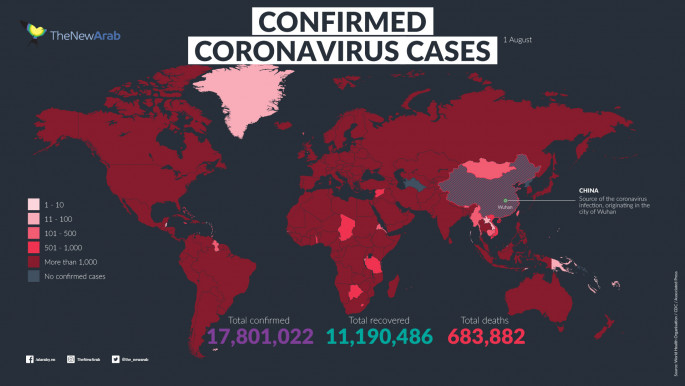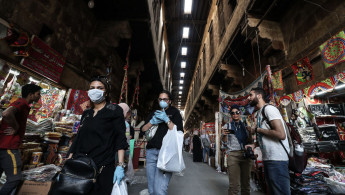Egypt leverages 'soft power' through medical aid in Covid-19 pandemic
A slickly produced video releaed last month by the office of Egyptian President Abdel Fattah al-Sisi showed crates of coronavirus medical supplies -- stamped in English and Arabic with the words "from the Egyptian people to the American people" -- being loaded onto a military cargo plane.
The dramatically scored video was Egypt's latest attempt to project soft power globally by sending medical aid to countries that have included China, Italy, Sudan and the United Kingdom.
But analysts described these gestures of political goodwill as tokenistic at a time when Egypt's own healthcare system is overstretched.
In March -- before the pandemic had claimed over 296,000 lives -- Egypt's health minister Hala Zayed was the first minister from abroad to visit Beijing since the outbreak began.
Zayed then appeared weeks later in a choreographed trip to Italy, an early European epicentre of the virus, personally delivering masks and gloves to the foreign minister.
Egyptians quickly lampooned her on social media, with one popular joke noting that Sisi was sending Zayed on mercy missions abroad hoping to get rid of her over her handling of the health crisis.
Pundits online also criticised her ministry for ignoring shortages of personal protective equipment (PPE) among healthcare workers in Egypt.
"Health diplomacy has been one of the traditional strategies for global south states who seek to have a more prominent role in the global arena," Gerasimos Tsourapas, a political scientist at the University of Birmingham, told AFP.
"I read this as a short-term strategy that may not be necessarily thought through to the end, given Egypt's growing needs for protective equipment."
"In terms of soft power, Egypt tends to prioritise foreign policy considerations over domestic ones," Tsourapas added.
Egypt's confirmed COVID-19 cases have reached nearly 10,500 with over 550 fatalities, including nine doctors and six nurses. But some observers say the real toll could be much higher due to low levels of testing.
'No lasting impact'
Last month, Egypt sent the United States a C-130 military plane loaded with medical equipment. It was a striking role reversal for a country which is a leading recipient of American aid, receiving about $1.3 billion annually.
The plane brought 200,000 masks, 48,000 shoe covers and 20,000 surgical caps among other supplies, said Dutch Ruppersberger, a Democrat in the US House of Representatives who heads a bipartisan group promoting relations with Egypt.
"This is why international diplomacy and maintaining relationships with allies like Egypt are essential not in times of crisis, but every day," he wrote on Twitter.
But Yezid Sayigh, an expert on Egypt's military at Carnegie's Middle East Centre in Beirut, suggested the donation reflected the Sisi administration's "special fondness for PR gestures and rhetoric".
Sayigh said the message behind Egypt's global outreach was intended to "buttress its claims about its superior wisdom and capability and its demands for respect domestically".
Since assuming power in 2014, following the military overthrow of Egypt's first democratically elected president Mohamed Morsi the year before, general-turned-president Sisi has cultivated personal relationships with US President Donald Trump, Chinese President Xi Jinping and Russian leader Vladimir Putin.
These friendships have translated into considerable arms purchases, with Egypt ranking third globally in weapons imports.
Last week, the State Department cleared the way for Egypt to refurbish 43 Apache helicopters in a deal worth $2.3 billion.
The military plays an outsized role in Egyptian public life, with activities ranging from building highways and producing Ramadan soap operas to most recently selling personal PPE to citizens.
Follow us on Facebook, Twitter and Instagram to stay connected





 Follow the Middle East's top stories in English at The New Arab on Google News
Follow the Middle East's top stories in English at The New Arab on Google News
![The UAE is widely suspected of arming the RSF militia [Getty]](/sites/default/files/styles/image_330x185/public/2024-11/GettyImages-472529908.jpg?h=69f2b9d0&itok=Yauw3YTG)
![Netanyahu furiously denounced the ICC [Getty]](/sites/default/files/styles/image_330x185/public/2024-11/GettyImages-2169352575.jpg?h=199d8c1f&itok=-vRiruf5)
![Both Hamas and the Palestinian Authority welcomed the ICC arrest warrants [Getty]](/sites/default/files/styles/image_330x185/public/2024-11/GettyImages-2178351173.jpg?h=199d8c1f&itok=TV858iVg)